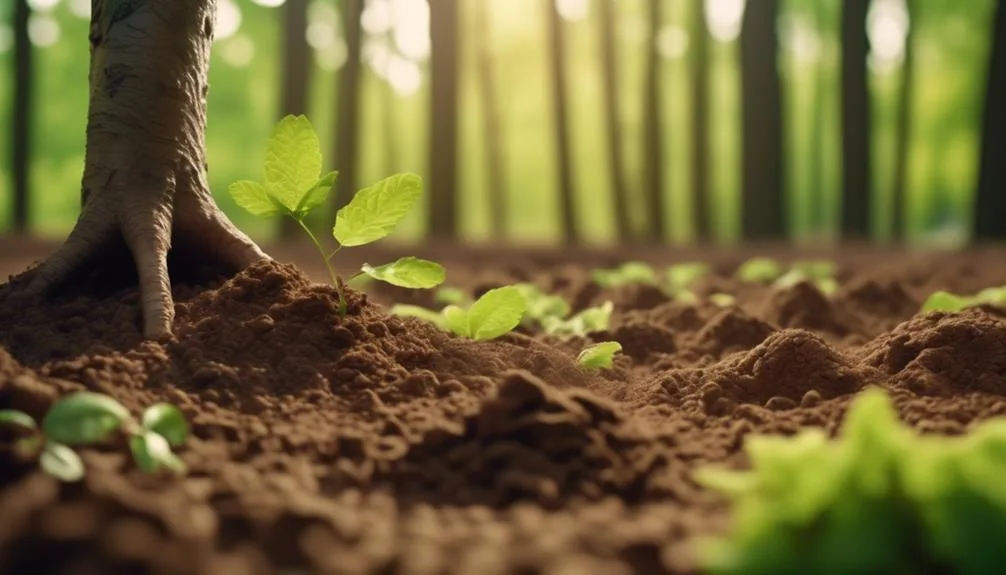For your garden to resemble a peaceful forest with graceful elm trees, you must start with the right soil. Elm trees need specific soil types with the right nutrients, drainage, and pH levels to thrive.
It's essential to find the best soil for growing elm trees to ensure their health and long life. Stay with us to learn about the ideal soil types for creating a flourishing elm tree haven in your own backyard.
Clay Loam Soil
When you're considering the soil type for growing elm trees, clay loam soil provides an ideal balance of moisture retention and drainage for healthy root development. This soil type consists of a mixture of sand, silt, and clay, offering the necessary nutrients for elm trees to thrive.
To improve clay soil for optimal elm growth, consider incorporating organic matter such as compost or well-rotted manure. This will enhance the soil's structure, making it more conducive to root penetration and water movement.
Additionally, testing the pH levels and adjusting them as needed can further optimize the soil composition for elms.
Well-Drained Sandy Soil
If you want to cultivate healthy elm trees, well-drained sandy soil offers excellent conditions for robust root development and overall growth. Sandy soil is characterized by its large particles, which create large pore spaces that allow for good drainage and aeration, promoting healthy root growth. This type of soil composition also warms up quickly in the spring, providing a favorable environment for early root activity and growth.
Additionally, the coarse texture of sandy soil allows for easy root penetration, enabling elm trees to establish strong and extensive root systems. While sandy soil drains well, it also presents a challenge in water retention. To counteract this, incorporating organic matter such as compost or peat moss can improve the soil's water-holding capacity, ensuring that the elm trees receive adequate moisture for sustained growth.
Rich, Moist Soil
To promote optimal growth of elm trees, rich, moist soil provides a nourishing environment for robust root development and overall vitality. This type of soil preparation is essential for water retention, ensuring that the elm trees have access to the moisture they require for healthy growth. The rich, moist soil also supports a diverse ecosystem of beneficial microorganisms that contribute to the overall health of the trees. When preparing the soil for planting elm trees, it's crucial to incorporate organic matter such as compost or well-rotted manure to enhance its richness and moisture-retaining capabilities. Here's a table summarizing the key characteristics of rich, moist soil:
| Key Characteristics | Description |
|---|---|
| Texture | Loamy |
| Organic Matter | High content |
| Water Retention | Excellent |
| Drainage | Moderate to Good |
With these attributes, rich, moist soil provides an ideal foundation for thriving elm trees.
Ph-Neutral Soil
As you explore soil types suitable for growing elm trees, the pivot now focuses on the importance of maintaining a pH-neutral soil environment to support their optimal development. Achieving a pH-neutral soil is crucial for elm trees as it ensures their access to essential nutrients.
Here are key aspects to consider:
- Soil Testing: Regularly conduct soil tests to monitor the pH levels and make necessary adjustments to maintain neutrality.
- Nutrient Management: Understand the specific nutrient requirements of elm trees and ensure that the soil pH level allows for proper nutrient uptake.
- Balanced Growth: Maintaining a pH-neutral soil creates a balanced environment, promoting healthy root development and overall growth of elm trees.
Fertile, Deep Soil
Why is fertile, deep soil crucial for the successful growth of elm trees? Elm trees thrive in fertile, deep soil due to its composition and nutrient availability. The soil composition directly impacts the tree's ability to access essential nutrients and water. Elm trees require a well-draining soil that retains moisture without becoming waterlogged, making deep soil ideal for their growth. Nutrient availability is also vital for the development of strong, healthy elm trees. The deep soil allows the roots to penetrate and access a wide range of nutrients, promoting robust growth and a sturdy foundation. This type of soil provides ample space for the roots to spread, ensuring efficient nutrient uptake and overall tree health.
| Key Benefits of Fertile, Deep Soil for Elm Trees |
|---|
| 1. Enhanced Nutrient Absorption |
| 2. Improved Water Retention |
| 3. Promotes Strong Root Development |
| 4. Supports Overall Tree Health |
Conclusion
To ensure your elm trees thrive, plant them in the right soil type. Clay loam, sandy, rich, moist, pH-neutral, or fertile, deep soil are all suitable options. Choosing the right soil type is crucial for their strength and beauty. Happy planting for a lasting, healthy garden!

My interest in trees started when I first saw the giant sequoias in Yosemite.
I was a teenager then, and I remember thinking, “I need to learn more about this.”
That moment stuck with me.
A few years later, I went on to study forestry at Michigan Tech.
Since graduating, I’ve worked in a mix of hands-on tree care and community education.
I’ve spent over ten years helping people understand how to plant, maintain, and protect the trees in their neighborhoods.
I don’t see trees as just part of the landscape.
They are living things that make a real difference in our daily lives.
